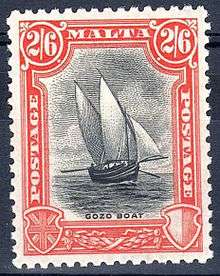Gozo boat
_Art.IWMART3120.jpg)
The Gozo boat (Maltese: Dgħajsa ta’ Għawdex, tal-latini, tat-tagħbija, tal-pass or tal-mogħdija) was a type of settee-rigged boat originating from Malta. Gozo boats were the main means of transport across the Gozo Channel between Gozo and the main island of Malta[1] from at least 1241 to the 1960s.
History

Gozo boats evolved from the speronara (Maltese: xprunara), which was found all over the Mediterranean Sea.[1] The oldest records of a transport link between Gozo and Malta date back to 1241, when the boat was known as a dgħajsa tal-mogħdija or tal-pass. By the 16th century, Gozo boats took the shape of a brigantine. In the 1880s, many Gozo boats changed their sail arrangements to a settee rig. In 1919, engines began to be installed on some Gozo boats, although many still retained their sails.[2]
Most Gozo boats were built at Kalkara in the Grand Harbour. The Caruana family, who were the last builders of Gozo boats, moved from there to Mġarr on Gozo in 1940. After 1959, a few Gozo boats were built in Gela, Sicily. The last one to be built was the Santa Rita (G48) in 1963.[2]
Gozo boats usually made trips from the Grand Harbour in Malta to Mġarr Harbour on Gozo. Other trips were made from the Grand Harbour to Mellieħa or to Marfa, or Mġarr to Marfa or St. Paul's Bay. The boats carried both passengers and cargo between the two islands. Trips from Gozo to Malta were generally loaded with agricultural products such as fruit, vegetables, eggs and poultry, while return trips from Malta to Gozo were loaded with manufactured goods such as cement, soft drinks and beer.[3]
Gozo boats were painted in shades of green, blue, red and yellow, similar to the traditional luzzu. One boat was painted black to carry corpses between the islands.[3]
Accidents
There were a number of accidents involving Gozo boats. Some were hit by rifle fire while passing the Pembroke Rifle Ranges, although the authorities warned the boats' masters in advance. In 1900, a Gozo boat used that was being used for lampuki fishing capsized, killing one fisherman. Another boat lost her masts in 1911, but it managed to enter St. George's Bay. In 1926, an unoccupied Gozo boat was found adrift in rough seas. In rare cases, they were involved in collisions with tugboats or pinnaces.[2]
In World War II, the boat Stella Maris was destroyed by enemy action.
Decline
By the 1960s and 1970s, regular steamer services began to compete with the Gozo boats, which were no longer suitable for the changing socio-economic situation. The remaining boats were converted into fishing boats, or were abandoned at Mġarr Harbour.[2]
Since 1979, the Gozo ferry service has been operated by Gozo Channel Company Limited, which now uses modern RORO ferries.[4]
Surviving examples
)_09_ies.jpg)
Very few Gozo boats still survive today.[5] One of these is the Sacra Famiglia (G32), which was built in Kalkara in 1933.[6] It had become unseaworthy by the 1970s, and was beached at Mġarr. The hulk was eventually purchased by a private individual who wanted to sell it to the Ministry for Gozo. It was then purchased by the Gozo Channel Company Limited, who handed it to Wirt Għawdex and sponsored its restoration. After the boat was restored by the Caruana brothers (the sons of its original builder), it was placed on permanent display at the Żewwieqa promenade in 2014.[7][8]
Another surviving Gozo boat is the Maryanne, which was built in Gela in 1960. The boat remained in Gozo until February 1983, when it was purchased by Captain Morgan Cruises. The boat still belongs to Captain Morgan, and it is used for cruises around Marsamxett and the Grand Harbour. Maryanne is in good condition, but it no longer has the distinctive masts and a deck has been added.[9]
Another two or three Gozo boats which were converted into fishing boats might still exist.[2]
Legacy

The Gozo boat has become a symbol of the island of Gozo,[10] and a boat sailing on rough waters is featured on the flag and coat of arms of the village of Qala.[11] Gozo boats are also found in the logos of various Gozitan organizations, such as the Gozo Philatelic Society[12] and the Imperial Gozo Yacht Club.[13]
The classical 1970s song Id-Dgħajsa tal-Latini by the Maltese band New Cuorey is about a Gozo boat.[14]
References
- 1 2 Morana, Martin (2011). Bejn Kliem u Storja (in Maltese). Malta: Books Distributors Limited. ISBN 978-99957-0137-6. Archived from the original on 5 October 2016.
- 1 2 3 4 5 Muscat, Joseph (1999). "The Gozo boat". Gozo Channel Co. Ltd. Fondazzjoni Patrimonju Malti. Archived from the original on 3 March 2012.
- 1 2 "Rites of passage". Let's Gozo: 16–17. June 2007. Retrieved 25 July 2015.
- ↑ "History". Gozo Channel Co. Ltd. Archived from the original on 29 March 2015.
- ↑ Dougall, Angelo (August 1983). "The Gozo Boat - Extinction of a breed" (PDF). L-Imnara. Għaqda tal-Folklor. 2 (1): 13–15. Retrieved 25 July 2015.
- ↑ "Id-Dgħajsa Tal-Latini to dominate Mġarr Harbour again". The Malta Independent. 8 August 2011. Retrieved 25 July 2015.
- ↑ "Dgħajsa Tal-Latini". Wirt Għawdex. Archived from the original on 25 July 2015.
- ↑ "'Dghajsa Tal-Latini' fully restored & on display at the Zewwieqa Waterfront". Gozo News. 2 November 2014. Retrieved 25 July 2015.
- ↑ "Maryanne". Captain Morgan Cruises. Archived from the original on 27 October 2013.
- ↑ "Gozo". gozoandmalta.com. Retrieved 25 July 2015.
- ↑ "About Qala". Qala Local Council. Archived from the original on 8 April 2011.
- ↑ "About Us". Gozo Philatelic Society. Retrieved 25 July 2015.
- ↑ "Imperial Gozo Yacht Club opens new premises at Mgarr". Gozo News. 24 October 2007. Retrieved 25 July 2015.
- ↑ Schiavone, Michael J. (2009). Dictionary of Maltese Biographies Vol. 1 A-F. Pietà: Pubblikazzjonijiet Indipendenza. p. 189. ISBN 9789993291329.
| Wikimedia Commons has media related to Gozo boat. |